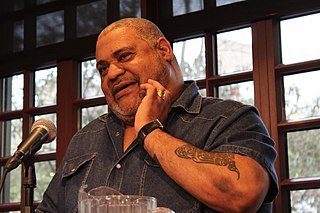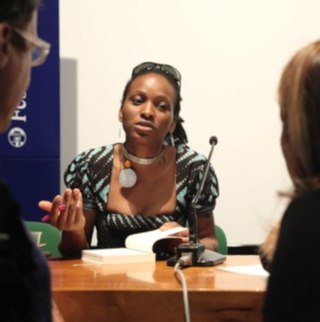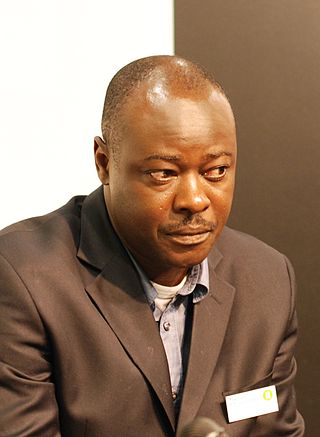
Linton Kwesi Johnson, also known as LKJ, is a Jamaica-born, British-based dub poet and activist. In 2002 he became the second living poet, and the only black one, to be published in the Penguin Modern Classics series. His performance poetry involves the recitation of his own verse in Jamaican patois over dub-reggae, usually written in collaboration with reggae producer/artist Dennis Bovell.
Gabriel Imomotimi Okara was a Nigerian poet and novelist who was born in Bumoundi in Yenagoa, Bayelsa State, Nigeria. The first modernist poet of Anglophone Africa, he is best known for his early experimental novel, The Voice (1964), and his award-winning poetry, published in The Fisherman's Invocation (1978) and The Dreamer, His Vision (2005). In both his poems and his prose, Okara drew on African thought, religion, folklore and imagery, and he has been called "the Nigerian Negritudist". According to Brenda Marie Osbey, editor of his Collected Poems, "It is with publication of Gabriel Okara's first poem that Nigerian literature in English and modern African poetry in this language can be said truly to have begun."

Nigerian literature may be roughly defined as the literary writing by citizens of the nation of Nigeria for Nigerian readers, addressing Nigerian issues. This encompasses writers in a number of languages, including not only English but Igbo, Urhobo, Yoruba, and in the northern part of the county Hausa and Nupe. More broadly, it includes British Nigerians, Nigerian Americans and other members of the African diaspora.
Niyi Osundare is a leading African poet, dramatist, linguist, and literary critic. Born on March 12, 1947 in Ikere-Ekiti, Nigeria, his poetry is influenced by the oral poetry of his Yoruba culture, which he capaciously hybridizes with other poetic traditions of the world, including African American, Latin American, Asian, and European.

Christopher Abani is a Nigerian-American and Los Angeles- based author. He says he is part of a new generation of Nigerian writers working to convey to an English-speaking audience the experience of those born and raised in "that troubled African nation".

Chika Nina Unigwe is a Nigerian-born Igbo author who writes in English and Dutch. In April 2014 she was selected for the Hay Festival's Africa39 list of 39 Sub-Saharan African writers aged under 40 with potential and talent to define future trends in African literature. Previously based in Belgium, she now lives in the United States.
Amatoritsero Ede is a Nigerian-Canadian poet. He had written under the name "Godwin Ede" but he stopped bearing his Christian first name as a way to protest the xenophobia and racism he noted in Germany, a "Christian" country, and to an extent, to protest Western colonialism in general. Ede has lived in Canada since 2002, sponsored as a writer-in-exile by PEN Canada. He was a Hindu Monk with the Hare Krishna Movement, and has worked as a Book Editor with a major Nigerian trade publisher, Spectrum Books.

Helon Habila Ngalabak is a Nigerian novelist and poet, whose writing has won many prizes, including the Caine Prize in 2001. He worked as a lecturer and journalist in Nigeria before moving in 2002 to England, where he was a Chevening Scholar at the University of East Anglia, and now teaches creative writing at George Mason University, Fairfax, Virginia.
Tanure Ojaide is a Nigerian poet and academic. As a writer, he is noted for his unique stylistic vision and for his intense criticism of imperialism, religion, and other issues. He is regarded as a socio-political and an ecocentric poet. He won the 2018 Wole Soyinka Prize for Literature in Africa with his collection Songs of Myself: A Quartet (2017).
Tade Ipadeola is a Nigerian poet who writes in English and Yoruba. He is a practising lawyer. In 2013 his poetry collection The Sahara Testaments won the prestigious Nigeria Prize for Literature instituted by the Nigeria Liquified Natural Gas (NLNG). In 2009, he won the Delphic Laurel in Poetry for his Yoruba poem "Songbird" at the Delphic Games in Jeju, South Korea.

Echezonachukwu Chinedu Nduka is a Nigerian poet, author, pianist, recording artist, and musicologist specializing in piano music by West African composers. His work has been featured on BBC, Radio Nacional Clasica de Argentina, Radio France International (rfi), and Classical Journey.

Abubakar Adam Ibrahim is a Nigerian writer and journalist. He was described by German broadcaster Deutsche Welle as a northern Nigerian "literary provocateur" amidst the international acclaim his award-winning novel Season of Crimson Blossoms received in 2016.

Akin Adesokan is a Nigerian writer, scholar and novelist with research interests into twentieth and twenty-first century African and African American/African Diaspora literature and cultures. He is currently the associate professor of comparative literature at Indiana University Bloomington. He exerts influence on Nigerian cultural environment through commentary, advocacy, and writing.
Ikeogu Oke was a Nigerian author, journalist and award-winning poet. In 2017, he won the Nigeria Prize for Literature for his first collection of poetry The Heresiad.
Su'eddie Vershima Agema is a Nigerian poet, editor and literary administrator. He is also a culture promoter. Author of two poetry collections, Bring our Casket Home: Tales one Shouldn’t Tell, and Home Equals Holes: Tale of an Exile, a short story collection, The Bottom of Another Tale and the NLNG Nigeria prize for literature 2022 nominated shortlisted book - Memory and the Call of Water. Agema is a past Chairman of the Association of Nigerian Authors (ANA) as well as Council Member, National Teen Authorship Scheme.
Parrésia, also Parrésia Publishers Ltd, is a publishing company in Nigeria founded by Azafi Omoluabi Ogosi and Richard Ali in 2012 with the aim of selling books to the Nigerian reading audience and promote the freedom of the imagination and the free press. It was described in 2017 by The New York Times as one of "a handful of influential new publishing houses" in Africa in the last decade.

Nigeria Prize for Literature is a Nigerian literary award given annually since 2004 to honor literary erudition by Nigerian authors. The award rotates among four genres; fiction, poetry, drama and children's literature, repeating the cycle every four years. With the total prize value of US$100,000 to individual winner, it is the biggest literary award in Africa and one of the richest literary awards in the world.
Chijioke Amu-Nnadi is a Nigerian poet and author. His poem poetry was his first published work, appearing in the 1987 anthology of new Nigerian poetry, Voices from the Fringe, edited by Harry Garuba.
Rasaq Malik Gbolahan is a Nigerian poet and essayist. With Ọ̀rẹ́dọlá Ibrahim, Malik is the co-founder of Àtẹ́lẹwọ́, the first digital journal devoted to publishing works written in the Yorùbá language. He was the founding Editor-in-Chief of Agbowó.
Saddiq Dzukogi is a Nigerian poet and assistant professor at Mississippi State University's Department of English. He is the author of Your Crib, My Qibla, a highly-acclaimed poetry collection which has earned him the 2022 Derek Walcott Prize for Poetry, and the 2021 Julie Suk Award as a co-winner. The collection was also shortlisted for the $100,000 Nigeria Prize for Literature.








